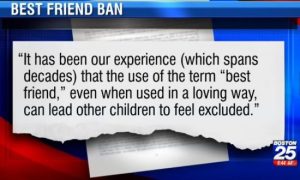Parents in Massachusetts were left outraged after a preschool allegedly forbid their children from using a common, simple phrase. Deeming the words “offensive,” students were told not to say them again. But, parents say this has gone too far.
Christine Hartwell was left in total disbelief when her 4-year-old daughter Julia came home from preschool saddened by a chain of events that occurred in her classroom. It was so infuriating, the Massachusetts family said they were looking for a new preschool for the girl since her current school barred the use of a common phrase often uttered by children and adults.
According to Hartwell, Julia came home from the Pentucket Workshop Preschool in Georgetown, appearing rather upset and acting differently than usual. “When I asked her what was wrong she said she was really sad about what her teacher did that day,” Hartwell recalled. Then, her little girl told her that her teacher said she couldn’t call one of her classmates her “best friend.”
In disbelief and outraged, Christine Hartwell questioned her daughter’s school. She and her husband went to the director at Pentucket Workshop to find out more about the policy, which she said is not spelled out in the school handbook. Shockingly, the school defended their stance, saying they’ve done research on the pros and cons of using the term “best friend” and found banning the term promotes inclusion in the classroom. They also made it clear that they would continue to discourage children from using the phrase in group settings.
“It has been our experience (which spans decades) that the use of the term ‘best friend,’ even when used in a loving way, can lead other children to feel excluded […] which can ultimately lead to the formation of ‘cliques’ and ‘outsiders,’” school officials said in a letter they sent to the Hartwells, the New York Post reported. Of course, Hartwell found the explanation to be “outrageous” and “silly,” saying children should be allowed to speak from their heart.
The mother fears the “ban” can end up having a negative effect on her daughter, who’s been left confused and upset. Hartwell explained that her daughter is now hesitant to call anyone her best friend anymore. “Even now, she goes to say it in a loving way, ‘I’m going to see my best friend Charlie’ or this one or that, and she looks at me sideways,” Hartwell said, according to The Washington Post. “She’s checking in with me to see if it’s okay,” she furthered.
“How do you police a four-year-old from expressing their feelings?” Christine Hartwell asked, according to Boston 25 News. “It’s outrageous, it’s silly [and] it hurts.” Hartwell also feels that best friends allow kids to feel more secure at school, which is why she was planning on pulling Julia from the preschool and finding a new one where her daughter can still call someone her best friend. “I want her to be able to express her thoughts and feelings in a healthy way, as children should,” Hartwell said. Others seemed to agree as the “ban” gained widespread media attention.

After sparking controversy, the school quickly seemed to change their tune, saying there was no ban on the term. “Contrary to erroneous reports in the news media and on social media, Pentucket Workshop Preschool has no policy banning the use of the term, ‘best friends,’” the Pentucket Workshop Preschool wrote in a posting online. “It is unfortunate that our best intentions have been mischaracterized,” they added.
“For over 47 years, Pentucket Workshop Preschool has helped nurture young children by promoting kindness and respect. We continue that work by fostering a climate of acceptance. Due to our commitment to confidentiality, we will make no further statements,” the school’s post concluded.

Although it appears the banning was never a written policy, it’s undeniable that the school tried to discourage the use of the phrase by their own admission. Then, they tried to backpedal when they were met with criticism. It’s natural and healthy to have friends, and yes, that includes having a favorite or closest friend. Perhaps the school should focus more on teaching kids how to make friends and be a friend rather than discouraging them from using harmless words.
What’s more, exclusion isn’t always a bad thing either. Marriage is typically exclusionary. Should we get rid of that too? Where does one draw the line? Instead of trying to force inclusion, maybe we should get back to teaching children how to cope with exclusion. You can encourage children to be nice to one another, have manners, and be tolerant without demanding they include everyone in everything. Whether we verbalize it with the phrase “best friend” or not, people will have those whom they are naturally closer to and prefer to hang out with. Maybe our kids just need to learn to deal with the reality that they will not be everyone’s favorite all the time.





